-
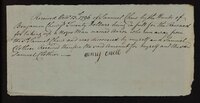 Accounts-- Record of payment from Benjamin Chew, Jr. to Henry Onail for capture of a runaway slave, October 13, 1796
Accounts-- Record of payment from Benjamin Chew, Jr. to Henry Onail for capture of a runaway slave, October 13, 1796 Receipt of payment to Henry Onail (also spelled Oneil in other documents), for the "taking up" of a runaway slave named Aaron from one of Samuel Chew's plantations. Henry and another man named Samuel Clothier were paid $20, issued by Benjamin Chew, Jr.
-
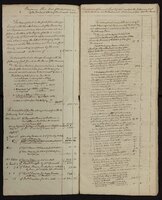 Estate of Samuel Chew-- Comprehensive account by Benjamin Chew, Jr. with details on Samuel's slaves, n.d.
Estate of Samuel Chew-- Comprehensive account by Benjamin Chew, Jr. with details on Samuel's slaves, n.d. A detailed account book of expenses and disbursements of the goods of Samuel Chew's estate as rendered but its executor, Benajmin Chew, Jr. between 1809-1811. It records cash found in Samuel's home (in pockets, letters, etc.) and received from others, such as for the purchase of wheat, unspecified debt, and even the sale of "Negro Jemima" in Philadelphia for $120 on page 1. Almost directly across from it on the following page is an expense of eight blankets as "the Black People in Cecil were in want of bed cloathing." Also sent to the slaves was $183.50 worth of bacon from the Chestertown house to the farms in Cecil as "the Black People were out of meat." Further on is an appraisal of $70 for enslaved woman Charlotte, and her son for $10, bequeathed to Samuel's servant Elizabeth Constable for 7 years in his will. The account addresses certain slaves at Rich Neck plantation, including "the negro man named Dick" who "being very sickly" has been given the privilege of working when he is able and being taken care of by the estate, appraised at $75. Below, a child named Harriet is appraised for $5. At Great Plantation, a woman named Phillis has also been given privilege of being taken care of by the estate, despite being elderly and infirm. She is appraised at $5, while two other negro women "in like manner" named Molly and Patty are also appraised at $5. Moving on to Frisby's Meadows, there is an appraisal of negro women named Phoebe and her mother Lemon, as well as a 6 month old child named James, son of Phoebe. On the following page, $1 is recorded being paid to "a faithful old negro man from Swan Point who came to attend the remains of his master."
-
 Accounts-- Benjamin Chew, Jr. for his father for expenses of the burial of Nelly, a potential slave, 1807
Accounts-- Benjamin Chew, Jr. for his father for expenses of the burial of Nelly, a potential slave, 1807 Accounts from March-June 1807, with a line dating April 11th for the burial of Nelly, potential slave, at St. Thomas's Church, as well cost of hickory (possibly for the coffin?), the hiring of a carriage for transport from a man named Hickey, and payment for D. Evans for the coffin. Also records a box of tea for $10. These expenses are also reflected in item 19238.
-
 Accounts-- Memo by Benjamin Chew, Jr. for his father for a burial and coffin of Nelly, a potential slave, 1808
Accounts-- Memo by Benjamin Chew, Jr. for his father for a burial and coffin of Nelly, a potential slave, 1808 Small memo found within larger account by Benjamin Chew, Jr. for his father, presumably from the same year of 1808. The memo records payment of $23.80 for the burial of "Nelly", a possible slave, and $10 to D. Evans for a coffin. There is also a payment to "Hickey" for "hir[ing] of the load" for $2.50.
-
 Accounts-- Benjamin Chew, Jr. in account with his father, 1809
Accounts-- Benjamin Chew, Jr. in account with his father, 1809 Account between Benjamin Chew, Jr. and his father, dating February-May 1809. Under May 1st is payment for a "Negro man saw of wood" for $4.67 in cash. Does not specify what the work was exactly for.
-
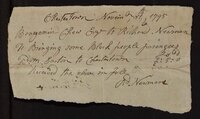 Accounts-- receipt to Richard Newman for transportation of Benjamin Chew, Jr.'s slaves, November 15, 1795
Accounts-- receipt to Richard Newman for transportation of Benjamin Chew, Jr.'s slaves, November 15, 1795 Small receipt written to a man named Richard Newman for "bringing some Black people [pasangees?] from Easton to Chestertown for 2 pounds 5 shillings. On the back is a note stating this money was received by Newman for "bringing my negroes from Talbot."
-
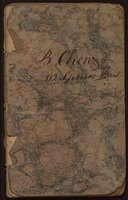 Account book for Frisby Meadows and personal finances belonging to Benjamin Chew, Jr., 1810-1811
Account book for Frisby Meadows and personal finances belonging to Benjamin Chew, Jr., 1810-1811 A small account book for both Frisby Meadows and Benjamin Chew, Jr.'s personal finances, dating from 1810-1811 and reading "B. Chew; 112 Spruce Street" on the cover. Entries focus on the plantation, such as notes & records regarding crops, livestock, and sundry work, but also include personal matters such as his father's estate. One of the most notable entries describes "Dr. Scanlan's return of black people made to me" (slaves from Frisby Meadows), found on page 4. Among those returned to Chew, there was a boy recorded as "Perre," though Chew could not find record anywhere that a "'Perre' has been sold or disposed of." It seems that they concluded the child was mistaken for another 5 year old boy named Jonathan, but it is not entirely clear. The following page features what seems to be a list of slaves hired out, to whom, and for how much.
-
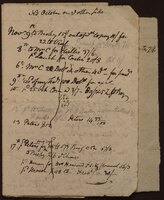 Small booklet within Cliveden household account book with slaves' names and household goods, 1798
Small booklet within Cliveden household account book with slaves' names and household goods, 1798 An informal, small collection of folded paper within this household account book lists many of the Chew family's enslaved people. All pages feature a vertical line, essentially crossing out the information. Many lines read a date then "to Mrs. C." and the slave's name and a number after them. For instance, "Nov 8th to Mrs. C for Phillis 37/6". There are also lines for mutton, lamb, stamps, pepper, oysters, and other household goods, as well as indication of which individual may gone to purchase then. One line on the second page suggests that Phillis was lent out to someone, but the script after is illegible. The last page lists the road tax at Cliveden.
-
 Note referencing purchase of coffin by Benjamin Chew for Joseph Turner estate, 1788
Note referencing purchase of coffin by Benjamin Chew for Joseph Turner estate, 1788 Small note referring to the purchase of a poplar coffin from Jesse Williams for 1.15 pounds. The coffin was paid for by Benjamin Chew, Jr. for a man or boy named Hampshire, formerly a slave on the Joseph Turner estate.
-
 Day-to-day account of farming and estate keeping practices at Cliveden, 1799
Day-to-day account of farming and estate keeping practices at Cliveden, 1799 Day-by-day account of the farming and estate management practices of Cliveden for June 1799, as well as a few days in May and July, recorded by Benjamin Chew, Jr. Over an area that includes a meadow, garden, orchard, and barn, the work includes mowing the estate with scythes, baling and moving hay, raking, weeding, moving "loads" of other presumably produce, amongst other tasks. There are a number of laborers mentioned consistently throughout the document, but it is not clear who is enslaved, a paid servant, or perhaps an indentured servant. They include a man repeatedly referred to as Black or Negro James, as well a few others such as Old Peggy, Fanny, and Polly, The last page lists four payments to Chew for labor, including the servant's name and the tasks they performed.
-
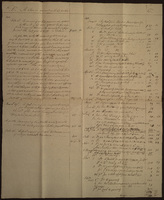 Accounts-- Expenses and payments received recorded by Benjamin Chew, Jr. for Mary Oswald Chew, 1811
Accounts-- Expenses and payments received recorded by Benjamin Chew, Jr. for Mary Oswald Chew, 1811 Copy of a list of accounts by Benjamin Chew, Jr. for his mother, Elizabeth Oswald Chew. The account includes a wide range of expenses and services, including medical, slave labor, and rent money received from tenants. There are multiple transactions referring to a likely-enslaved man named John, often referred to as Black John or Negro John, including receipt of a $70 payment from a Mr. Rodemaker for John's "time and service" in October 1810. There is also a payment for the bleeding of a negro woman (possibly "Hannah"), for $2.50.
-
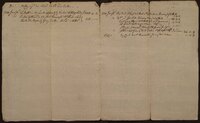 Accounts-- Expenses recorded by Benjamin Chew, Jr. for Samuel Chew, 1799
Accounts-- Expenses recorded by Benjamin Chew, Jr. for Samuel Chew, 1799 Copy of a short list of expenses by Benajmin Chew, Jr. for Samuel Chew. There are multiple lines for the plantation Whitehall and one for Duck Cross Roads. There is an expense for a porter/overseer for blankets, as well as a negro woman with the mention of cloth. The line is not legible enough to discern whether the payment is for the woman or something regarding cloth, perhaps for the enslaved women. The last line mentions "Henriette", but it is difficult to read what the context is.
-
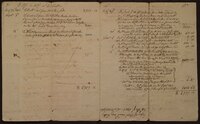 Accounts-- Expenses recorded by Benjamin Chew, Jr. for Samuel Chew, 1805
Accounts-- Expenses recorded by Benjamin Chew, Jr. for Samuel Chew, 1805 Copy of an account of various expenses of Samuel Chew's by Benjamin Chew, Jr., ranging from August 1805-September 1805. One payment that stands out is a sum of two and half pounds to a man named Thomas Exeter for a coffin for "Rachel's child", potentially enslaved.
-
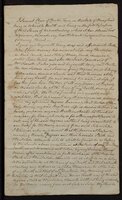 Copy of the Last Will and Testament of Samuel Chew
Copy of the Last Will and Testament of Samuel Chew Copy of the Last Will and Testament of Samuel Chew. First bequeaths his plantation Swan Point and another unnamed plot of land in Kent County, Maryland, to his brother John, as well as the "labour and service of my Negroes on, or belonging to the above devised lands." He also gives John his approval to sell any slaves for his own profit, and the "time and labour of my house servant Jack for the space of seven years," later in the will stating that Jack is to be freed after the seven years of service. After John's death, the land and "all the negroes and stock" is to be given to Anna Marie Chew Hollyday. He also leaves Anna his late wife's jewelry and the service of his "Negro woman Mary," also for seven years, after which she is to be freed, as well. Mary's child, unnamed, is to continue service until he "attain[s] his age of twenty-five years." To his nephew, Benjamin Chew, Jr., he leaves his plantation in Sassafrass Neck, Cecil County, including all slaves. His servant Elizabeth Constable is to receive her wages plus $300, as well as the service of enslaved woman named Charlotte for six years, after which she is to be freed "as a small reward for her faithful services to me for the long time she had lived in my family." He carries on to give money to members of the Tilghman and Smyth families, and then to his brother, John, two additional slaves, named Jenny and Darky. The will reiterates the eventual manumission of his slaves Jack, Mary, Mary's son, and Charlotte, then states that his "faithful man Richard", a house servant, is to be liberated upon his death and given $200 and all of Samuel's clothing.
-
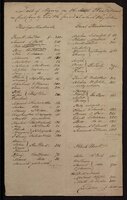 Estate of Samuel Chew-- a collection of documents with details on the sale of Samuel Chew's enslaved people from three Cecil County plantations
Estate of Samuel Chew-- a collection of documents with details on the sale of Samuel Chew's enslaved people from three Cecil County plantations This folder primarily focuses on the sales of Samuel Chew's enslaved people, including multiple lists of the sales of slaves from Chew's plantations of Cecil County, including Frisby Meadows, Rich Neck, and Great Plantation. One document records the slaves by name, who they were sold to, and the price. There is a short letter from George W. Thomas to Benjamin Chew expressing that he would like to purchase "a few for his own use." There is a second document of the three Cecil County plantations, listing the slaves, their ages, who bought them, and their price, in some cases infants given to their mothers, wives reunited with husbands, slaves exchanged, or not sold. Another "extract from the inventory of S. Chew's estate relating to the negroes and stock on the different plantations...also the appraisal of each"- lists slaves and horses. There is also a letter from James Scanlan to Benjamin Chew, Jr., confirming Benjamin's request for a "list of the negroes and to whom sold." The folder also contains a list of slaves sold, including their ages, price, and to whom, from one of Benjamin Chew's plantations.
-
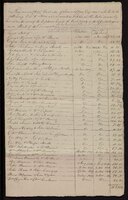 Estate of Samuel Chew-- List of notes and securities taken by the sales under the order of the Orphans Court
Estate of Samuel Chew-- List of notes and securities taken by the sales under the order of the Orphans Court List of notes and securities taken by the sales made by Benjamin Chew under the order of the Orphans Court of Kent County and "of the effects of Negroes and stock of the deceased." There are two lines for Richard Frisby on page 4 with a note next to it, reading "secured also by assignm'[ent] of negroes." The last line of the list also specifies the purchase of a "another negro woman @ $300 for which no note was taken." Under this line is an additional note written in pencil, "No this a mistake"- referring to the small memorandum later inserted by Benjamin Chew. It indicates that the purchaser, Kensey Johns, also purchased another woman for $100. The memorandum advises that this full list was made by Richard Barroll, and sent to him two months later, resulting in inaccuracies.
-
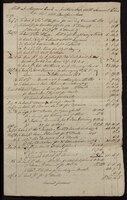 Estate of Samuel Chew-- Account of Morgan's Creek Mill in Partnership with Samuel Chew, by Benjamin Chambers, 1809
Estate of Samuel Chew-- Account of Morgan's Creek Mill in Partnership with Samuel Chew, by Benjamin Chambers, 1809 List of expenses of the Mill at Morgan's Creek in association with Samuel Chew, accounted by Benjamin Chambers, likely dating from 1809 (the year of Chew's death and last line on the account). The account lists a wide range of services and goods, from rum and nails to slave labor. On December 24, 1797, he lists "Negro George for work on Dam," and "Negro Will for work on...Do [possibly also the dam?]."
-
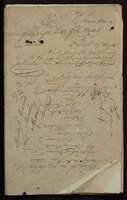 Estate of Samuel Chew-- Accounts, James Scanlan's Ledger, 1809-1810
Estate of Samuel Chew-- Accounts, James Scanlan's Ledger, 1809-1810 John Scanlan's ledger, managing expenses of Samuel Chew's estate after his death. Recorded is a payment to John Sappington, a plantation manager or overseer, for "damaged corn." Under the account of William Hackel is a list of payments for items such as wool and corn, as well as two cash payments. Contra to Hackel specified on the facing page lists a payment for wages as overseer of Frisby's Meadows.
-
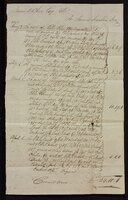 Estate of Samuel Chew-- Accounts with Dr. James Scanlan, 1786-1815, undated
Estate of Samuel Chew-- Accounts with Dr. James Scanlan, 1786-1815, undated Collection of Samuel Chew's receipts, accounting & tax documents, and bills, including post-partum signed by Richard Frisby. Includes an extensive bill from John Crookshanks for shoes and various repairs and sundry work. There are also two detailed "medical accounts," with costs - one from Dr. James Scanlan dating from 1809, the other to Scanlan from "The Estate of Samuel Chew Esq., Deceased," also dated 1809. A "memo of the particulars of the claim" of John Frye is also included, mentioning a deceased Captain Walker, possibly referencing an unpaid bill due to Scanlan. "
-
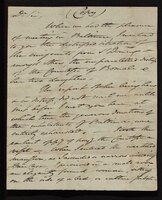 L. Alexander to Unspecified, January 01, 1794
L. Alexander to Unspecified, January 01, 1794 Copy of a letter from "L. Alexander" of Baltimore, describing a woman, identified as a countess, explaining that her husband, the count, had emigrated to England in 1792, leaving her and their five children behind. The count instructed the countess to leave their sons under the care of their steward, and embark with the girls to St. Domingo. It is possibly implied that they were driven from their comfortable home by the "insurrections of the negroes and embarked on the convoy for this place shortly after the destruction of the Cape."
-
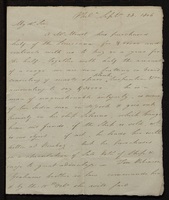 Edward Tilghman, Jr. to Samuel Chew, September 28, 1806
Edward Tilghman, Jr. to Samuel Chew, September 28, 1806 Letter from Edward Tilghman, Jr. to Samuel Chew discussing the purchase of half of the ship Louisiana by a man named Minot. Together they are onboarding masts, plank, and turpentine. He describes the purchaser as a man of "unquestionable integrity" and owner of two "India men" in New York. Describes Minot's other ship, Silenus, and its shipments of cotton to Bombay.
-
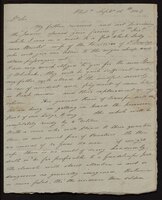 Edward Tilghman, Jr. to Samuel Chew, September 16, 1804
Edward Tilghman, Jr. to Samuel Chew, September 16, 1804 Letter from Edward Tilghman, Jr. to Samuel Chew, opens by recounting his visit to a "fat black lady near Bristol, wife of the treasurer of St. Domingo who will give me letters to the negro chiefs and obtain passengers out." Proceeds to tell Samuel that provisions and unspecified cargo are being onboarded, and that they should not fear privateers on this voyage but have "20 guns [and] 150 men" at hand if needed. Edward then brings up politics, stating that the Court of Madrid just delivered a dispatch to Washington by newly arrived cutter, and that he anticipates the French to invade immediately.
-
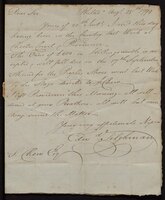 Edward Tilghman, Jr. to Samuel Chew, August 25, 1794
Edward Tilghman, Jr. to Samuel Chew, August 25, 1794 Letter from Edward Tilghman to Samuel Chew, advising that an order of $600 for "Hollingsworth" is accepted. The following line states "the People's Shoes went last week by stage to J. Chew." There is no additional information to clarify what he is referring to.
-
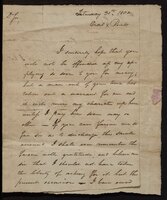 Samuel A. Thompson to Samuel Chew, 1800
Samuel A. Thompson to Samuel Chew, 1800 Letter from Samuel A. Thompson, a possible overseer of one of Samuel Chew's plantations (written from "Cecile X Roads".) The letter is asking for money to pay for a warrant against himself, though it does not go into detail what he is accused of. Thompson ends by confirming that "the People on your farms have all been healthy as yet and I hope they may remain so", likely referring to slaves.
-
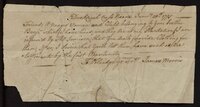 John Morris to Samuel Chew, January 20, 1775
John Morris to Samuel Chew, January 20, 1775 Letter from John Morris to Samuel Chew, writing from Duck Creek Cross Roads, informing Samuel that a "Neagro woman and child belonging to your brother Benj[amin]" that he has "hired" from Benjamin have arrived on his plantation. He is writing primarily to request the clothing that he was told Samuel would provide to the enslaved woman and child upon their arrival, asking him to send "by the first opportunity."
 Accounts-- Record of payment from Benjamin Chew, Jr. to Henry Onail for capture of a runaway slave, October 13, 1796 Receipt of payment to Henry Onail (also spelled Oneil in other documents), for the "taking up" of a runaway slave named Aaron from one of Samuel Chew's plantations. Henry and another man named Samuel Clothier were paid $20, issued by Benjamin Chew, Jr.
Accounts-- Record of payment from Benjamin Chew, Jr. to Henry Onail for capture of a runaway slave, October 13, 1796 Receipt of payment to Henry Onail (also spelled Oneil in other documents), for the "taking up" of a runaway slave named Aaron from one of Samuel Chew's plantations. Henry and another man named Samuel Clothier were paid $20, issued by Benjamin Chew, Jr. Estate of Samuel Chew-- Comprehensive account by Benjamin Chew, Jr. with details on Samuel's slaves, n.d. A detailed account book of expenses and disbursements of the goods of Samuel Chew's estate as rendered but its executor, Benajmin Chew, Jr. between 1809-1811. It records cash found in Samuel's home (in pockets, letters, etc.) and received from others, such as for the purchase of wheat, unspecified debt, and even the sale of "Negro Jemima" in Philadelphia for $120 on page 1. Almost directly across from it on the following page is an expense of eight blankets as "the Black People in Cecil were in want of bed cloathing." Also sent to the slaves was $183.50 worth of bacon from the Chestertown house to the farms in Cecil as "the Black People were out of meat." Further on is an appraisal of $70 for enslaved woman Charlotte, and her son for $10, bequeathed to Samuel's servant Elizabeth Constable for 7 years in his will. The account addresses certain slaves at Rich Neck plantation, including "the negro man named Dick" who "being very sickly" has been given the privilege of working when he is able and being taken care of by the estate, appraised at $75. Below, a child named Harriet is appraised for $5. At Great Plantation, a woman named Phillis has also been given privilege of being taken care of by the estate, despite being elderly and infirm. She is appraised at $5, while two other negro women "in like manner" named Molly and Patty are also appraised at $5. Moving on to Frisby's Meadows, there is an appraisal of negro women named Phoebe and her mother Lemon, as well as a 6 month old child named James, son of Phoebe. On the following page, $1 is recorded being paid to "a faithful old negro man from Swan Point who came to attend the remains of his master."
Estate of Samuel Chew-- Comprehensive account by Benjamin Chew, Jr. with details on Samuel's slaves, n.d. A detailed account book of expenses and disbursements of the goods of Samuel Chew's estate as rendered but its executor, Benajmin Chew, Jr. between 1809-1811. It records cash found in Samuel's home (in pockets, letters, etc.) and received from others, such as for the purchase of wheat, unspecified debt, and even the sale of "Negro Jemima" in Philadelphia for $120 on page 1. Almost directly across from it on the following page is an expense of eight blankets as "the Black People in Cecil were in want of bed cloathing." Also sent to the slaves was $183.50 worth of bacon from the Chestertown house to the farms in Cecil as "the Black People were out of meat." Further on is an appraisal of $70 for enslaved woman Charlotte, and her son for $10, bequeathed to Samuel's servant Elizabeth Constable for 7 years in his will. The account addresses certain slaves at Rich Neck plantation, including "the negro man named Dick" who "being very sickly" has been given the privilege of working when he is able and being taken care of by the estate, appraised at $75. Below, a child named Harriet is appraised for $5. At Great Plantation, a woman named Phillis has also been given privilege of being taken care of by the estate, despite being elderly and infirm. She is appraised at $5, while two other negro women "in like manner" named Molly and Patty are also appraised at $5. Moving on to Frisby's Meadows, there is an appraisal of negro women named Phoebe and her mother Lemon, as well as a 6 month old child named James, son of Phoebe. On the following page, $1 is recorded being paid to "a faithful old negro man from Swan Point who came to attend the remains of his master." Accounts-- Benjamin Chew, Jr. for his father for expenses of the burial of Nelly, a potential slave, 1807 Accounts from March-June 1807, with a line dating April 11th for the burial of Nelly, potential slave, at St. Thomas's Church, as well cost of hickory (possibly for the coffin?), the hiring of a carriage for transport from a man named Hickey, and payment for D. Evans for the coffin. Also records a box of tea for $10. These expenses are also reflected in item 19238.
Accounts-- Benjamin Chew, Jr. for his father for expenses of the burial of Nelly, a potential slave, 1807 Accounts from March-June 1807, with a line dating April 11th for the burial of Nelly, potential slave, at St. Thomas's Church, as well cost of hickory (possibly for the coffin?), the hiring of a carriage for transport from a man named Hickey, and payment for D. Evans for the coffin. Also records a box of tea for $10. These expenses are also reflected in item 19238. Accounts-- Memo by Benjamin Chew, Jr. for his father for a burial and coffin of Nelly, a potential slave, 1808 Small memo found within larger account by Benjamin Chew, Jr. for his father, presumably from the same year of 1808. The memo records payment of $23.80 for the burial of "Nelly", a possible slave, and $10 to D. Evans for a coffin. There is also a payment to "Hickey" for "hir[ing] of the load" for $2.50.
Accounts-- Memo by Benjamin Chew, Jr. for his father for a burial and coffin of Nelly, a potential slave, 1808 Small memo found within larger account by Benjamin Chew, Jr. for his father, presumably from the same year of 1808. The memo records payment of $23.80 for the burial of "Nelly", a possible slave, and $10 to D. Evans for a coffin. There is also a payment to "Hickey" for "hir[ing] of the load" for $2.50. Accounts-- Benjamin Chew, Jr. in account with his father, 1809 Account between Benjamin Chew, Jr. and his father, dating February-May 1809. Under May 1st is payment for a "Negro man saw of wood" for $4.67 in cash. Does not specify what the work was exactly for.
Accounts-- Benjamin Chew, Jr. in account with his father, 1809 Account between Benjamin Chew, Jr. and his father, dating February-May 1809. Under May 1st is payment for a "Negro man saw of wood" for $4.67 in cash. Does not specify what the work was exactly for. Accounts-- receipt to Richard Newman for transportation of Benjamin Chew, Jr.'s slaves, November 15, 1795 Small receipt written to a man named Richard Newman for "bringing some Black people [pasangees?] from Easton to Chestertown for 2 pounds 5 shillings. On the back is a note stating this money was received by Newman for "bringing my negroes from Talbot."
Accounts-- receipt to Richard Newman for transportation of Benjamin Chew, Jr.'s slaves, November 15, 1795 Small receipt written to a man named Richard Newman for "bringing some Black people [pasangees?] from Easton to Chestertown for 2 pounds 5 shillings. On the back is a note stating this money was received by Newman for "bringing my negroes from Talbot." Account book for Frisby Meadows and personal finances belonging to Benjamin Chew, Jr., 1810-1811 A small account book for both Frisby Meadows and Benjamin Chew, Jr.'s personal finances, dating from 1810-1811 and reading "B. Chew; 112 Spruce Street" on the cover. Entries focus on the plantation, such as notes & records regarding crops, livestock, and sundry work, but also include personal matters such as his father's estate. One of the most notable entries describes "Dr. Scanlan's return of black people made to me" (slaves from Frisby Meadows), found on page 4. Among those returned to Chew, there was a boy recorded as "Perre," though Chew could not find record anywhere that a "'Perre' has been sold or disposed of." It seems that they concluded the child was mistaken for another 5 year old boy named Jonathan, but it is not entirely clear. The following page features what seems to be a list of slaves hired out, to whom, and for how much.
Account book for Frisby Meadows and personal finances belonging to Benjamin Chew, Jr., 1810-1811 A small account book for both Frisby Meadows and Benjamin Chew, Jr.'s personal finances, dating from 1810-1811 and reading "B. Chew; 112 Spruce Street" on the cover. Entries focus on the plantation, such as notes & records regarding crops, livestock, and sundry work, but also include personal matters such as his father's estate. One of the most notable entries describes "Dr. Scanlan's return of black people made to me" (slaves from Frisby Meadows), found on page 4. Among those returned to Chew, there was a boy recorded as "Perre," though Chew could not find record anywhere that a "'Perre' has been sold or disposed of." It seems that they concluded the child was mistaken for another 5 year old boy named Jonathan, but it is not entirely clear. The following page features what seems to be a list of slaves hired out, to whom, and for how much. Small booklet within Cliveden household account book with slaves' names and household goods, 1798 An informal, small collection of folded paper within this household account book lists many of the Chew family's enslaved people. All pages feature a vertical line, essentially crossing out the information. Many lines read a date then "to Mrs. C." and the slave's name and a number after them. For instance, "Nov 8th to Mrs. C for Phillis 37/6". There are also lines for mutton, lamb, stamps, pepper, oysters, and other household goods, as well as indication of which individual may gone to purchase then. One line on the second page suggests that Phillis was lent out to someone, but the script after is illegible. The last page lists the road tax at Cliveden.
Small booklet within Cliveden household account book with slaves' names and household goods, 1798 An informal, small collection of folded paper within this household account book lists many of the Chew family's enslaved people. All pages feature a vertical line, essentially crossing out the information. Many lines read a date then "to Mrs. C." and the slave's name and a number after them. For instance, "Nov 8th to Mrs. C for Phillis 37/6". There are also lines for mutton, lamb, stamps, pepper, oysters, and other household goods, as well as indication of which individual may gone to purchase then. One line on the second page suggests that Phillis was lent out to someone, but the script after is illegible. The last page lists the road tax at Cliveden. Note referencing purchase of coffin by Benjamin Chew for Joseph Turner estate, 1788 Small note referring to the purchase of a poplar coffin from Jesse Williams for 1.15 pounds. The coffin was paid for by Benjamin Chew, Jr. for a man or boy named Hampshire, formerly a slave on the Joseph Turner estate.
Note referencing purchase of coffin by Benjamin Chew for Joseph Turner estate, 1788 Small note referring to the purchase of a poplar coffin from Jesse Williams for 1.15 pounds. The coffin was paid for by Benjamin Chew, Jr. for a man or boy named Hampshire, formerly a slave on the Joseph Turner estate. Day-to-day account of farming and estate keeping practices at Cliveden, 1799 Day-by-day account of the farming and estate management practices of Cliveden for June 1799, as well as a few days in May and July, recorded by Benjamin Chew, Jr. Over an area that includes a meadow, garden, orchard, and barn, the work includes mowing the estate with scythes, baling and moving hay, raking, weeding, moving "loads" of other presumably produce, amongst other tasks. There are a number of laborers mentioned consistently throughout the document, but it is not clear who is enslaved, a paid servant, or perhaps an indentured servant. They include a man repeatedly referred to as Black or Negro James, as well a few others such as Old Peggy, Fanny, and Polly, The last page lists four payments to Chew for labor, including the servant's name and the tasks they performed.
Day-to-day account of farming and estate keeping practices at Cliveden, 1799 Day-by-day account of the farming and estate management practices of Cliveden for June 1799, as well as a few days in May and July, recorded by Benjamin Chew, Jr. Over an area that includes a meadow, garden, orchard, and barn, the work includes mowing the estate with scythes, baling and moving hay, raking, weeding, moving "loads" of other presumably produce, amongst other tasks. There are a number of laborers mentioned consistently throughout the document, but it is not clear who is enslaved, a paid servant, or perhaps an indentured servant. They include a man repeatedly referred to as Black or Negro James, as well a few others such as Old Peggy, Fanny, and Polly, The last page lists four payments to Chew for labor, including the servant's name and the tasks they performed. Accounts-- Expenses and payments received recorded by Benjamin Chew, Jr. for Mary Oswald Chew, 1811 Copy of a list of accounts by Benjamin Chew, Jr. for his mother, Elizabeth Oswald Chew. The account includes a wide range of expenses and services, including medical, slave labor, and rent money received from tenants. There are multiple transactions referring to a likely-enslaved man named John, often referred to as Black John or Negro John, including receipt of a $70 payment from a Mr. Rodemaker for John's "time and service" in October 1810. There is also a payment for the bleeding of a negro woman (possibly "Hannah"), for $2.50.
Accounts-- Expenses and payments received recorded by Benjamin Chew, Jr. for Mary Oswald Chew, 1811 Copy of a list of accounts by Benjamin Chew, Jr. for his mother, Elizabeth Oswald Chew. The account includes a wide range of expenses and services, including medical, slave labor, and rent money received from tenants. There are multiple transactions referring to a likely-enslaved man named John, often referred to as Black John or Negro John, including receipt of a $70 payment from a Mr. Rodemaker for John's "time and service" in October 1810. There is also a payment for the bleeding of a negro woman (possibly "Hannah"), for $2.50. Accounts-- Expenses recorded by Benjamin Chew, Jr. for Samuel Chew, 1799 Copy of a short list of expenses by Benajmin Chew, Jr. for Samuel Chew. There are multiple lines for the plantation Whitehall and one for Duck Cross Roads. There is an expense for a porter/overseer for blankets, as well as a negro woman with the mention of cloth. The line is not legible enough to discern whether the payment is for the woman or something regarding cloth, perhaps for the enslaved women. The last line mentions "Henriette", but it is difficult to read what the context is.
Accounts-- Expenses recorded by Benjamin Chew, Jr. for Samuel Chew, 1799 Copy of a short list of expenses by Benajmin Chew, Jr. for Samuel Chew. There are multiple lines for the plantation Whitehall and one for Duck Cross Roads. There is an expense for a porter/overseer for blankets, as well as a negro woman with the mention of cloth. The line is not legible enough to discern whether the payment is for the woman or something regarding cloth, perhaps for the enslaved women. The last line mentions "Henriette", but it is difficult to read what the context is. Accounts-- Expenses recorded by Benjamin Chew, Jr. for Samuel Chew, 1805 Copy of an account of various expenses of Samuel Chew's by Benjamin Chew, Jr., ranging from August 1805-September 1805. One payment that stands out is a sum of two and half pounds to a man named Thomas Exeter for a coffin for "Rachel's child", potentially enslaved.
Accounts-- Expenses recorded by Benjamin Chew, Jr. for Samuel Chew, 1805 Copy of an account of various expenses of Samuel Chew's by Benjamin Chew, Jr., ranging from August 1805-September 1805. One payment that stands out is a sum of two and half pounds to a man named Thomas Exeter for a coffin for "Rachel's child", potentially enslaved. Copy of the Last Will and Testament of Samuel Chew Copy of the Last Will and Testament of Samuel Chew. First bequeaths his plantation Swan Point and another unnamed plot of land in Kent County, Maryland, to his brother John, as well as the "labour and service of my Negroes on, or belonging to the above devised lands." He also gives John his approval to sell any slaves for his own profit, and the "time and labour of my house servant Jack for the space of seven years," later in the will stating that Jack is to be freed after the seven years of service. After John's death, the land and "all the negroes and stock" is to be given to Anna Marie Chew Hollyday. He also leaves Anna his late wife's jewelry and the service of his "Negro woman Mary," also for seven years, after which she is to be freed, as well. Mary's child, unnamed, is to continue service until he "attain[s] his age of twenty-five years." To his nephew, Benjamin Chew, Jr., he leaves his plantation in Sassafrass Neck, Cecil County, including all slaves. His servant Elizabeth Constable is to receive her wages plus $300, as well as the service of enslaved woman named Charlotte for six years, after which she is to be freed "as a small reward for her faithful services to me for the long time she had lived in my family." He carries on to give money to members of the Tilghman and Smyth families, and then to his brother, John, two additional slaves, named Jenny and Darky. The will reiterates the eventual manumission of his slaves Jack, Mary, Mary's son, and Charlotte, then states that his "faithful man Richard", a house servant, is to be liberated upon his death and given $200 and all of Samuel's clothing.
Copy of the Last Will and Testament of Samuel Chew Copy of the Last Will and Testament of Samuel Chew. First bequeaths his plantation Swan Point and another unnamed plot of land in Kent County, Maryland, to his brother John, as well as the "labour and service of my Negroes on, or belonging to the above devised lands." He also gives John his approval to sell any slaves for his own profit, and the "time and labour of my house servant Jack for the space of seven years," later in the will stating that Jack is to be freed after the seven years of service. After John's death, the land and "all the negroes and stock" is to be given to Anna Marie Chew Hollyday. He also leaves Anna his late wife's jewelry and the service of his "Negro woman Mary," also for seven years, after which she is to be freed, as well. Mary's child, unnamed, is to continue service until he "attain[s] his age of twenty-five years." To his nephew, Benjamin Chew, Jr., he leaves his plantation in Sassafrass Neck, Cecil County, including all slaves. His servant Elizabeth Constable is to receive her wages plus $300, as well as the service of enslaved woman named Charlotte for six years, after which she is to be freed "as a small reward for her faithful services to me for the long time she had lived in my family." He carries on to give money to members of the Tilghman and Smyth families, and then to his brother, John, two additional slaves, named Jenny and Darky. The will reiterates the eventual manumission of his slaves Jack, Mary, Mary's son, and Charlotte, then states that his "faithful man Richard", a house servant, is to be liberated upon his death and given $200 and all of Samuel's clothing. Estate of Samuel Chew-- a collection of documents with details on the sale of Samuel Chew's enslaved people from three Cecil County plantations This folder primarily focuses on the sales of Samuel Chew's enslaved people, including multiple lists of the sales of slaves from Chew's plantations of Cecil County, including Frisby Meadows, Rich Neck, and Great Plantation. One document records the slaves by name, who they were sold to, and the price. There is a short letter from George W. Thomas to Benjamin Chew expressing that he would like to purchase "a few for his own use." There is a second document of the three Cecil County plantations, listing the slaves, their ages, who bought them, and their price, in some cases infants given to their mothers, wives reunited with husbands, slaves exchanged, or not sold. Another "extract from the inventory of S. Chew's estate relating to the negroes and stock on the different plantations...also the appraisal of each"- lists slaves and horses. There is also a letter from James Scanlan to Benjamin Chew, Jr., confirming Benjamin's request for a "list of the negroes and to whom sold." The folder also contains a list of slaves sold, including their ages, price, and to whom, from one of Benjamin Chew's plantations.
Estate of Samuel Chew-- a collection of documents with details on the sale of Samuel Chew's enslaved people from three Cecil County plantations This folder primarily focuses on the sales of Samuel Chew's enslaved people, including multiple lists of the sales of slaves from Chew's plantations of Cecil County, including Frisby Meadows, Rich Neck, and Great Plantation. One document records the slaves by name, who they were sold to, and the price. There is a short letter from George W. Thomas to Benjamin Chew expressing that he would like to purchase "a few for his own use." There is a second document of the three Cecil County plantations, listing the slaves, their ages, who bought them, and their price, in some cases infants given to their mothers, wives reunited with husbands, slaves exchanged, or not sold. Another "extract from the inventory of S. Chew's estate relating to the negroes and stock on the different plantations...also the appraisal of each"- lists slaves and horses. There is also a letter from James Scanlan to Benjamin Chew, Jr., confirming Benjamin's request for a "list of the negroes and to whom sold." The folder also contains a list of slaves sold, including their ages, price, and to whom, from one of Benjamin Chew's plantations. Estate of Samuel Chew-- List of notes and securities taken by the sales under the order of the Orphans Court List of notes and securities taken by the sales made by Benjamin Chew under the order of the Orphans Court of Kent County and "of the effects of Negroes and stock of the deceased." There are two lines for Richard Frisby on page 4 with a note next to it, reading "secured also by assignm'[ent] of negroes." The last line of the list also specifies the purchase of a "another negro woman @ $300 for which no note was taken." Under this line is an additional note written in pencil, "No this a mistake"- referring to the small memorandum later inserted by Benjamin Chew. It indicates that the purchaser, Kensey Johns, also purchased another woman for $100. The memorandum advises that this full list was made by Richard Barroll, and sent to him two months later, resulting in inaccuracies.
Estate of Samuel Chew-- List of notes and securities taken by the sales under the order of the Orphans Court List of notes and securities taken by the sales made by Benjamin Chew under the order of the Orphans Court of Kent County and "of the effects of Negroes and stock of the deceased." There are two lines for Richard Frisby on page 4 with a note next to it, reading "secured also by assignm'[ent] of negroes." The last line of the list also specifies the purchase of a "another negro woman @ $300 for which no note was taken." Under this line is an additional note written in pencil, "No this a mistake"- referring to the small memorandum later inserted by Benjamin Chew. It indicates that the purchaser, Kensey Johns, also purchased another woman for $100. The memorandum advises that this full list was made by Richard Barroll, and sent to him two months later, resulting in inaccuracies. Estate of Samuel Chew-- Account of Morgan's Creek Mill in Partnership with Samuel Chew, by Benjamin Chambers, 1809 List of expenses of the Mill at Morgan's Creek in association with Samuel Chew, accounted by Benjamin Chambers, likely dating from 1809 (the year of Chew's death and last line on the account). The account lists a wide range of services and goods, from rum and nails to slave labor. On December 24, 1797, he lists "Negro George for work on Dam," and "Negro Will for work on...Do [possibly also the dam?]."
Estate of Samuel Chew-- Account of Morgan's Creek Mill in Partnership with Samuel Chew, by Benjamin Chambers, 1809 List of expenses of the Mill at Morgan's Creek in association with Samuel Chew, accounted by Benjamin Chambers, likely dating from 1809 (the year of Chew's death and last line on the account). The account lists a wide range of services and goods, from rum and nails to slave labor. On December 24, 1797, he lists "Negro George for work on Dam," and "Negro Will for work on...Do [possibly also the dam?]." Estate of Samuel Chew-- Accounts, James Scanlan's Ledger, 1809-1810 John Scanlan's ledger, managing expenses of Samuel Chew's estate after his death. Recorded is a payment to John Sappington, a plantation manager or overseer, for "damaged corn." Under the account of William Hackel is a list of payments for items such as wool and corn, as well as two cash payments. Contra to Hackel specified on the facing page lists a payment for wages as overseer of Frisby's Meadows.
Estate of Samuel Chew-- Accounts, James Scanlan's Ledger, 1809-1810 John Scanlan's ledger, managing expenses of Samuel Chew's estate after his death. Recorded is a payment to John Sappington, a plantation manager or overseer, for "damaged corn." Under the account of William Hackel is a list of payments for items such as wool and corn, as well as two cash payments. Contra to Hackel specified on the facing page lists a payment for wages as overseer of Frisby's Meadows. Estate of Samuel Chew-- Accounts with Dr. James Scanlan, 1786-1815, undated Collection of Samuel Chew's receipts, accounting & tax documents, and bills, including post-partum signed by Richard Frisby. Includes an extensive bill from John Crookshanks for shoes and various repairs and sundry work. There are also two detailed "medical accounts," with costs - one from Dr. James Scanlan dating from 1809, the other to Scanlan from "The Estate of Samuel Chew Esq., Deceased," also dated 1809. A "memo of the particulars of the claim" of John Frye is also included, mentioning a deceased Captain Walker, possibly referencing an unpaid bill due to Scanlan. "
Estate of Samuel Chew-- Accounts with Dr. James Scanlan, 1786-1815, undated Collection of Samuel Chew's receipts, accounting & tax documents, and bills, including post-partum signed by Richard Frisby. Includes an extensive bill from John Crookshanks for shoes and various repairs and sundry work. There are also two detailed "medical accounts," with costs - one from Dr. James Scanlan dating from 1809, the other to Scanlan from "The Estate of Samuel Chew Esq., Deceased," also dated 1809. A "memo of the particulars of the claim" of John Frye is also included, mentioning a deceased Captain Walker, possibly referencing an unpaid bill due to Scanlan. " L. Alexander to Unspecified, January 01, 1794 Copy of a letter from "L. Alexander" of Baltimore, describing a woman, identified as a countess, explaining that her husband, the count, had emigrated to England in 1792, leaving her and their five children behind. The count instructed the countess to leave their sons under the care of their steward, and embark with the girls to St. Domingo. It is possibly implied that they were driven from their comfortable home by the "insurrections of the negroes and embarked on the convoy for this place shortly after the destruction of the Cape."
L. Alexander to Unspecified, January 01, 1794 Copy of a letter from "L. Alexander" of Baltimore, describing a woman, identified as a countess, explaining that her husband, the count, had emigrated to England in 1792, leaving her and their five children behind. The count instructed the countess to leave their sons under the care of their steward, and embark with the girls to St. Domingo. It is possibly implied that they were driven from their comfortable home by the "insurrections of the negroes and embarked on the convoy for this place shortly after the destruction of the Cape." Edward Tilghman, Jr. to Samuel Chew, September 28, 1806 Letter from Edward Tilghman, Jr. to Samuel Chew discussing the purchase of half of the ship Louisiana by a man named Minot. Together they are onboarding masts, plank, and turpentine. He describes the purchaser as a man of "unquestionable integrity" and owner of two "India men" in New York. Describes Minot's other ship, Silenus, and its shipments of cotton to Bombay.
Edward Tilghman, Jr. to Samuel Chew, September 28, 1806 Letter from Edward Tilghman, Jr. to Samuel Chew discussing the purchase of half of the ship Louisiana by a man named Minot. Together they are onboarding masts, plank, and turpentine. He describes the purchaser as a man of "unquestionable integrity" and owner of two "India men" in New York. Describes Minot's other ship, Silenus, and its shipments of cotton to Bombay. Edward Tilghman, Jr. to Samuel Chew, September 16, 1804 Letter from Edward Tilghman, Jr. to Samuel Chew, opens by recounting his visit to a "fat black lady near Bristol, wife of the treasurer of St. Domingo who will give me letters to the negro chiefs and obtain passengers out." Proceeds to tell Samuel that provisions and unspecified cargo are being onboarded, and that they should not fear privateers on this voyage but have "20 guns [and] 150 men" at hand if needed. Edward then brings up politics, stating that the Court of Madrid just delivered a dispatch to Washington by newly arrived cutter, and that he anticipates the French to invade immediately.
Edward Tilghman, Jr. to Samuel Chew, September 16, 1804 Letter from Edward Tilghman, Jr. to Samuel Chew, opens by recounting his visit to a "fat black lady near Bristol, wife of the treasurer of St. Domingo who will give me letters to the negro chiefs and obtain passengers out." Proceeds to tell Samuel that provisions and unspecified cargo are being onboarded, and that they should not fear privateers on this voyage but have "20 guns [and] 150 men" at hand if needed. Edward then brings up politics, stating that the Court of Madrid just delivered a dispatch to Washington by newly arrived cutter, and that he anticipates the French to invade immediately. Edward Tilghman, Jr. to Samuel Chew, August 25, 1794 Letter from Edward Tilghman to Samuel Chew, advising that an order of $600 for "Hollingsworth" is accepted. The following line states "the People's Shoes went last week by stage to J. Chew." There is no additional information to clarify what he is referring to.
Edward Tilghman, Jr. to Samuel Chew, August 25, 1794 Letter from Edward Tilghman to Samuel Chew, advising that an order of $600 for "Hollingsworth" is accepted. The following line states "the People's Shoes went last week by stage to J. Chew." There is no additional information to clarify what he is referring to. Samuel A. Thompson to Samuel Chew, 1800 Letter from Samuel A. Thompson, a possible overseer of one of Samuel Chew's plantations (written from "Cecile X Roads".) The letter is asking for money to pay for a warrant against himself, though it does not go into detail what he is accused of. Thompson ends by confirming that "the People on your farms have all been healthy as yet and I hope they may remain so", likely referring to slaves.
Samuel A. Thompson to Samuel Chew, 1800 Letter from Samuel A. Thompson, a possible overseer of one of Samuel Chew's plantations (written from "Cecile X Roads".) The letter is asking for money to pay for a warrant against himself, though it does not go into detail what he is accused of. Thompson ends by confirming that "the People on your farms have all been healthy as yet and I hope they may remain so", likely referring to slaves. John Morris to Samuel Chew, January 20, 1775 Letter from John Morris to Samuel Chew, writing from Duck Creek Cross Roads, informing Samuel that a "Neagro woman and child belonging to your brother Benj[amin]" that he has "hired" from Benjamin have arrived on his plantation. He is writing primarily to request the clothing that he was told Samuel would provide to the enslaved woman and child upon their arrival, asking him to send "by the first opportunity."
John Morris to Samuel Chew, January 20, 1775 Letter from John Morris to Samuel Chew, writing from Duck Creek Cross Roads, informing Samuel that a "Neagro woman and child belonging to your brother Benj[amin]" that he has "hired" from Benjamin have arrived on his plantation. He is writing primarily to request the clothing that he was told Samuel would provide to the enslaved woman and child upon their arrival, asking him to send "by the first opportunity."